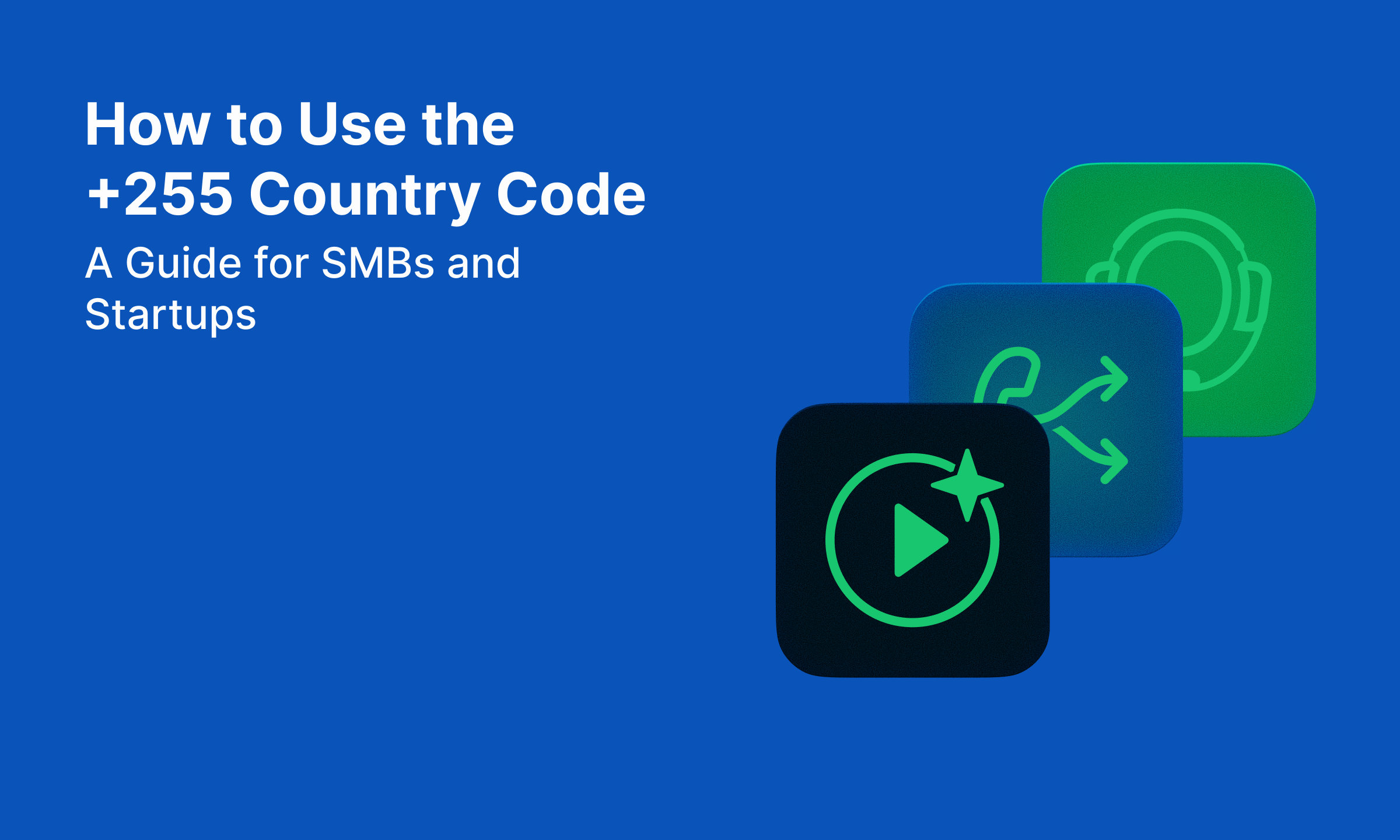Blog
Cloud Phone System
How to Use the +591 Country Code: A Guide for SMBs and Startups

How to Use the +591 Country Code: A Guide for SMBs and Startups
Learn how to format Bolivian phone numbers with the +591 country code. Explore correct dialing formats, common mistakes, and the best tools for SMBs and startups to simplify global communication.
Whether you're scheduling a supplier call in La Paz or connecting with a remote team member in Santa Cruz, understanding the correct way to format and dial Bolivian phone numbers is key to effective international communication.
This guide walks you through the 591 country code, formatting standards, and how DialLink helps small businesses simplify global calls and messaging.
What Is the 591 Country Code?
+591 is the international country code for Bolivia. When dialing Bolivian phone numbers from outside the country, you’ll need to use this prefix.
Here’s a breakdown:
- Country Code: +591
- Local Number Format: +591 XXX XXXXX
Bolivia uses a variable-length numbering system. Landlines typically consist of 7 digits, while mobile numbers are 8 digits long, usually beginning with a 6 or 7.
Common Pitfalls in International Number Formatting
Improper phone number formatting can lead to dropped calls or failed texts — issues that can cost time and revenue for SMBs operating across borders. Here are frequent mistakes businesses make with Bolivian phone numbers:
- Missing the +591 code – Essential when dialing from outside Bolivia.
- Adding trunk prefixes (like 0) – Bolivian numbers should be formatted without the trunk prefix when calling internationally.
- Inconsistent formats in CRMs – Using multiple formats (e.g., local vs. international) in tools like VoIP systems and customer databases can lead to syncing issues.
- Not identifying mobile vs. landline prefixes – Knowing the starting digit helps determine if you’re calling a mobile user (6 or 7) or a landline.
Standardizing your phone number format ensures higher connection rates and better data integrity across your communication platforms.
Make International Calling Easy with DialLink
DialLink is an AI-powered cloud phone system designed for small businesses and startups that need professional, reliable international communication.
Here’s how we make connecting with Bolivia easier:
- Affordable international calling – No hidden fees, no complicated setup
- Built-in AI voice agents – Automate routine tasks like call handling and appointment scheduling
- Cross-device support – Use your mobile, desktop, or desk phone
- Advanced calling features – Voicemail, call routing, call transcripts, and more
- Messaging tools – Send SMS or rich messages to Bolivian contacts with ease
DialLink keeps your international communication professional and organized without enterprise-level costs or IT support.
Common Bolivian Number Format Examples
| Type of Number | Example Format |
|---|---|
| Landline (La Paz) | +591 2 244 1234 |
| Mobile (Tigo/Entel) | +591 71234567 |
| Mobile (Viva) | +591 61234567 |
| Toll-Free (Bolivia) | 800 10 1234* |
*Note: Bolivian toll-free numbers typically cannot be dialed from outside the country.
How to Read and Format Bolivian Numbers
Bolivian phone numbers vary in length and structure. Here’s what you need to know:
- +591 – Bolivia’s international country code. Required when dialing from outside Bolivia.
- X – The next digit indicates the region or service type. For example:
- 2 – Landlines in La Paz
- 3 – Landlines in Santa Cruz
- 6 or 7 – Mobile numbers
- Remaining digits – These make up the local number, with the total length reaching 7 or 8 digits.
Format Variations
- International Format (E.164): +59171234567 – Best for CRMs and contact management
- Local Format (in Bolivia): 71234567 – Used when calling within the same area
- International Dialing Format (from abroad): 011 591 71234567 – Used when dialing from the US (replace 011 with appropriate exit code from other countries)
Best Practices for SMBs
- Always use +591 format when saving or syncing Bolivian contacts across tools
- Ensure consistency in formatting across your CRM, phone system, and communication tools.
- Avoid storing numbers without country or area codes — this leads to failed calls or misrouted messages.
By understanding how each part of a Bolivian phone number works, SMBs can reduce miscommunication, improve call connection rates, and maintain a professional image in international interactions.
+591 is the international dialing code for Bolivia, located in South America. It’s used when calling any Bolivian phone number from outside the country.
The international format is +591 followed by 7 to 8 digits, depending on whether it's a landline or mobile number (e.g., +591 71234567 for mobile).
Landlines typically have 7 digits, while mobile phone numbers have 8 digits (including a 6 or 7 at the start).
Not exactly. While all use +591, the total length and prefix vary by type (landline vs. mobile) and region.
These are North American toll-free numbers, not Bolivian phone numbers. Bolivia uses local toll-free codes like 800, which are not accessible internationally.
Featured Tags
Share

Arina Khoziainova
Content Writer at DialLink
Arina is a content writer with over 7 years of experience in the IT industry. At DialLink, she creates clear, insightful content that helps small business and startup owners simplify communication and drive growth using modern tools. With a strong focus on practical value, Arina transforms complex topics into accessible, actionable stories.
Keep Reading

How to Use the +1 242 Country Code: A Guide for SMBs and Startups
Learn how to correctly format Bahamian phone numbers using the +1 242 country code. A complete guide for SMBs and startups managing international calls.

How to Use the +1 808 Country Code: A Guide for SMBs and Startups
Learn how to properly format Hawaiian phone numbers using the +1 808 country code. Understand dialing rules, costs, and best practices for SMBs and startups communicating with Hawaii.

How to Use the +1 876 Country Code: A Guide for SMBs and Startups
Discover how to correctly format Jamaican phone numbers using the +1 876 country code. Explore associated costs and the best tools for SMBs and startups managing international communication.

How to Use the +220 Country Code: A Guide for SMBs and Startups
Learn how to correctly format Gambian phone numbers using the +220 country code. Explore associated costs and the best tools for SMBs and startups managing international communication.

How to Use the +221 Country Code: A Guide for SMBs and Startups
Learn how to format Senegalese phone numbers using the +221 country code. Explore associated costs and the best tools for SMBs and startups managing international communication.

How to Use the +230 Country Code: A Guide for SMBs and Startups
Learn how to correctly format Mauritius phone numbers using the +230 country code. Explore associated costs and the best tools for SMBs and startups managing international communication.

How to Use the +244 Country Code: A Guide for SMBs and Startups
Learn how to correctly format Angola phone numbers using the +244 country code. A practical guide for SMBs and startups managing global communications.

How to Use the +255 Country Code: A Guide for SMBs and Startups
Learn how to properly format Tanzanian phone numbers using the +255 country code. See examples, avoid formatting pitfalls, and simplify international calls with DialLink's AI-powered cloud phone system.